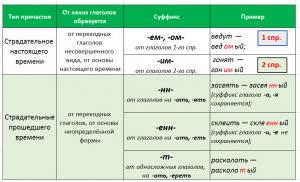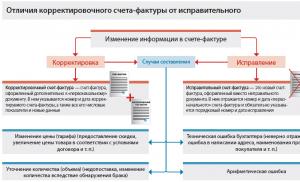Imperative form in German. Imperative form
As promised several lessons ago, we will consider the rules for forming incentive sentences in German.
An imperative sentence has no subject and the verb comes first.
Different verbs form the imperative mood in different ways. Let's look at some examples of strong and weak verbs.
Formation of the imperative mood with weak verbs
- Addressing “you” (du).
- Polite address as "you".
Tanz(e) – Dance!
Erzähle! - Tell me!
Interessiere dich! - Take an interest!
Tanzt! - Dance!
Erzahlt! - Tell me!
Interessiert euch! - Be interested!
Tanzen Sie! - Dance!
Forming the imperative mood with strong verbs
- Addressing “you” (du).
- Addressing "you", but to a group of people (ihr).
- Polite address as "you".
Sprich! - Speak! (from the verb sprechen - to speak)
Gib! - Give it! (from the verb geben - to give)
Fahr! - Go! (from the verb fahren - to go)
Sprecht! - Speak!
Gebt! - Let's!
Fahrt! - Go!
Sprechen Sie! - Speak!
As you can see, in the plural, the imperative mood of weak and strong verbs is formed according to the same rule.
The main difference is that in the singular of the first, weak verbs have an -e ending (for example, tanze), and strong ones have a zero ending (for example, sprich).
Another important feature is the change in the root vowel of some strong verbs that change the vowel in the 2nd and 3rd persons singular. Most often, verbs with the letters “e” in the root undergo changes - the vowel changes to “i” or “ie”. For example:
empfehlen - to advise
2nd sheet, singular: Empfiehl!
2nd letter, plural: Empfehlt!
Polite form: Empfehlen Sie!
In colloquial speech, the ending “e” is also dropped in weak verbs. Very often in informal communication the particle “mal” appears, which is similar to the Russian particle “ka”, in such expressions as: look - guck mal!, say - sag mal!
The polite form of the imperative mood is usually supplemented with the word “bitte” - please. Thus, the “command” turns into a request, which makes the phrase less harsh and much more pleasant to the addressee. For example:
Sagen Sie bitte…. - Tell me please…
Important! “bitte” is not separated by commas.
However, the imperative mood is not used very often in German, and for requests it is better to use forms of the subjunctive mood and phrases such as:
Könnten Sie mir bitte sagen…/ Würden Sie bitte sagen…. - Could you tell (me)...
If you want to offer something to your interlocutor, then the formula to use is very simple:
Tanzen wir!
Wollen wir tanzen!
As you remember, the verb “wollen” means “to want”, but in this case both sentences are translated as “Let’s dance!”, i.e. the modal verb in incentive sentences means “let’s”.
As for the verb “sein” - “to be”, its forms of the imperative mood just need to be remembered:
2nd sheet, singular: Sei! - Be!
2nd letter, plural: Seid! - Be!
Polite form: Seien Sie! Be!
Sentence: Sien wir! Wollen wir sein!
Two latest forms They are unlikely to come across you in everyday communication, but it will not hurt to know them.
Lesson assignments
Form the forms of the imperative mood (2nd person singular; 2nd person plural; polite form) from the following verbs:
- geben
- lesen (read)
- machen (to do)
- sagen
- kommen (to come)
- sehen (watch)
The imperative mood in German is called imperative (Imperativ) and, as in Russian, expresses direct appeal to someone, therefore the formation of the imperative mood is characteristic of the 2nd person in the singular and plural. The address can be “you” (confidential form) or “you” (polite form). The singular and plural forms of the polite form are expressed grammatically in the same way. The imperative mood of the 1st person singular stands out separately, which encourages the implementation of a joint action. Thus, there are four forms of the imperative mood. Now let's look at the method of formation and use of these forms.
TRUST FORM:
The singular trust form is formed by adding the suffix “–e” to the stem of the verb:
Zeige mir dein Buch! - Show me your book!
Bleibe ruhig! – Stay calm!
In colloquial speech, “-e” is often lost, but after “-t; -tm; –d; –ffn; –chn; –el; -ig” the use of the suffix “–e” is mandatory.
Sag bitte so nicht! - Don't say that, please! but Antworte auf meine Frage! - Answer my question!
In strong verbs, the root vowel “-e-” changes to “-i(e)-” without adding the suffix “-e”.
Schreiben – Schrieb!
Please note that strong verbs do not add an umlaut where it is in the subjunctive mood:
Laufe schneller! - Run faster! but Du läufst. - you are running.
Trust form plural coincides with the second person plural form (verb stem + -t):
Geht nach Hause! - Go home!
POLITE FORM
The imperative mood in German when polite treatment to one person or to a group of people is expressed grammatically in the same way: verb in the appropriate form + pronoun “Sie”:
Sagen Sie das noch einmal! - Repeat, please!
The imperative mood of the 1st person plural, as an incentive to perform a joint action, is formed from the form of the 1st person plural verb + the pronoun wir:
Gehen wir heute ins Theater! - Let's go to the theater today!
The separable verb prefix in the imperative mood is placed at the end of the sentence.
Mache bitte das Fenster zu! - Please close the window!
Pay attention to the formation of the imperative mood of the verb “sein”:
Sei aufmercksamer! - Be careful!
Seid aufmercksamer! - Be careful!
Seien Sie bitte aufmercksamer! Please be more careful!
The imperative mood is distinguished in speech by motivating intonation, and in writing an exclamation mark is placed at the end of the sentence.
A distinctive feature is that the structure of the incentive sentence differs from the typical structure German offer: the verb in the imperative comes first!
To give a sentence a polite connotation, words such as “bitte”, “bitte mal” are used.
Mach die Tür auf! - Open the door!
Mach die Tür bitte auf! - Please open the door!
The imperative mood in German can perform the following functions:
Appeal: Schützen Sie die Natur
Order: Macht eure Bücher zu!
Request: Gib mir bitte dein Buch! - Give me your book, please!
Advice: Rauch weniger! -Smoke less!
Prohibition: Rauch hier nicht! - Don't smoke here!
Warning: Stopp! Mache Musik leiser! Mama ist zu Hause. - Stop! Turn down the music! Mom is at home.
Introduction
The imperative (in Russian - the imperative mood) is used to express a request or order directly addressed to one or more interlocutors. The imperative has the following forms: du - you, ihr – you, wir – we and polite form Sie – you.
Beispiel
Fahrgast: Halten Sie!
Fahrer: Steigen Sie ein!
Fahrgast: Fahren Sie mich bitte zum Bahnhof!
Fahrer: Schnallen Sie sich bitte an!
Fahrgast: Fahren wir!
Use
An imperative expresses a call to action.
For example: Halten Sie! Stop! Steigen Sie ein! Sit down! Fahren Sie mich zum Bahnhof! Take me to the station!
1st person plural form (wir) used when the speaker addresses one or many persons, including himself among those being urged.
For example: Fahren wir! Let's go!
Note
To soften a request expressed by an imperative, you can use the word bitte- Please. Bitte, unlike Russian Please, is not separated by commas.
For example: Fahren Sie mich bitte zum Bahnhof!
Please take me to the station! Schnallen Sie sich bitte an!
Buckle up please! However, the imperative is not used as often in German as in Russian. Typically, a polite request is better expressed using the conjunctive. Often used constructions such as:
For example: Könnten Sie mir sagen, wo ich eine Bank finde?
Tell me, please, where can I find a bank?(Better than: Sagen Sie mir bitte, wo ich eine Bank finden kann.)
Ich hätte gerne sechs Brötchen.
Give me six buns, please.(Better than: Geben Sie mir bitte sechs Brötchen.)
Education
1st, 3rd person plural (wir/Sie)
The imperative of the 1st and 3rd person plural is formed using verb in infinitive + Sie/wir. In verb sein a letter is added e.
For example: Gehen Sie!/Seien Sie ehrlich! Go!/Be honest! Gehen wir!/Seien wir ehrlich! Let's go!/Let's be honest!
2nd person plural (ihr)
The 2nd person plural imperative has the same form as the 2nd person plural in the present, but is used without a pronoun.
For example: gehen → ihr geht → geht!
go!
sein → ihr seid → seid ehrlich!
be honest!
2nd person singular (du)
To form the 2nd person singular imperative, the ending of the infinitive form is omitted en. Sometimes in high style many verbs receive the ending e; in colloquial speech, as a rule, this ending is not added.
For example: Geh(e)!/Sei ehrlich! Go!/Be honest!
Features in the formation of the 2nd person singular imperative:
- Verbs with i/ie alternation retain this alternation in the imperative and do not receive an imperative ending e. For example: L ie s! (lesen – ich lese, du liest) (not: Liese!) Read!
- The alternation a/ä does not apply to the imperative. For example: F a hr! (But : ich fahre, du fährst) Go!
- If the verb stem in the present ends in d/t, then the ending e is always added to the imperative. For example: Wart e! (not: Wart!) Wait!
- If the verb stem in the present ends in a consonant +m/n, then the ending e is always added to the imperative. However, if this consonant is m, n, l, r or h (but not ch), ending e it is not necessary to add. For example: Atm e!/Zeichn e! Breathe!/Draw! aber: Schwimm(e)!/Lern(e)! Swim!/Learn!
- If the verb ends in eln/ern, then the ending e is always added. (Letter e at the end eln/ern may be omitted.) For example: Fei(e)r e!/Ang(e)l e! Celebrate!/Udi!
Imperative
Imperative in German (Imperativ) expresses a command, order or request. It is in some ways similar to the imperative mood in other European languages. This similarity is observed primarily in the fact that the formation of the imperative mood comes from the forms of the present tense verb and has three or four forms. In German: 2nd person singular, 1st and 2nd person plural, and the polite form, which is the same as the 3rd person plural. For verbs with a separable part, as in the present, this part goes to the end of the sentence (see § 31).
Forms of the 2nd person singular are formed using the suffix -e, although more and more often they simply refuse it. That is, it is not required for most words. The exception is when the stem of the verb ends in –d, -t, -ig, -chn, -ffn. This is done for convenience.
For some strong verbs, the formation of the imperative may occur slightly differently, but very predictably. Strong verbs with alternation e/i fundamentally get –i(e) as in present, but they do not have a suffix -e. However, verbs with –a-, -au- And -o- are fundamentally left without an umlaut. In the same way, other strong verbs do not change anything.
The forms of the imperative for the 2nd person plural and the polite form almost always coincide with the forms of the present, only in the 2nd person there is no personal pronoun, and with polite address it remains and comes after the verb in the imperative.
For the 1st person plural there is also nothing fancy. This form copies the present form, but the pronoun wir comes after the verb. This form assumes that the speaker himself is included in the circle of those who are subject to the order or request (this is inclusiveness). Often the form from this person is found in construction with the verb wollen.
The imperative mood is formed completely differently in irregular verbs haben and sein. They use the infinitive rather than the present as the basis for the imperative.
When addressing an indefinite circle of people (the public as a whole), the infinitive is often used. Such phrases can be found on inscriptions, signs, you can hear similar things at train stations or in other crowded places.
There are other ways to express motivation in a sentence. Among them, the infinitive and second participle are increasingly used. Both of them in some way express a categorical order that must be carried out immediately. Wed:
|
|
|
Also often the present and future tenses express motivation. This can be discovered contextually, even without knowing such a function of these tenses. Russian has this too.
- Du bleibst hier. Er verschwindet.- You stay here. He fails.
- Sie werden hier bleiben!- You will stay here!
There are still many ways to express a request, command or order. Among them: designs haben/sein + zu+ Infinitive, modal verbs, passive and subjunctive mood in the present tense. They all usually serve a different function, but in the context of speech, the meaning they express can be interpreted as a call to action.
| Previous lesson: 31. Verbs with separable and inseparable parts |
32. Imperative | Next lesson: 33. Forms of the future tense |
Imperative form
To express a request or order, a special imperative form is used - Imperative.
Franz, comm (mal) her! – Come here (du – you).
Jens und Petra, kommt mal her! - Come here (ihr - you).
Herr und Frau Schmidt, kommen Sie her! – Come here (Sie – You).
In the latter case (in a polite form) we simply see reverse order words Please note: it is not easy to say come over, A come over You (don't forget Sie).
Ihr kommt– you come(addressing children, friends or relatives with whom you are on a first-name basis). Here it is simply omitted ihr: Kommt! – Come over!
Of particular interest is the first form (du – you). you take du commst– are you coming and take away the personal ending - st. It turns out comm! - come!
But, you say, wouldn’t it be easier to just take Infinitive(indefinite form commen) and remove - en? This is possible, but you just need to remember that we have several verbs that are in the forms You And He change the root vowel:
geben (to give) – du gibst (you give) – gib! (give me!)
sehen (look) – du siehst (you look) – sieh mal! (look at that!)
What happens to verbs that are in forms You And He get Umlaut?
fahren (to go) – du fährst (you are going) – fahr! (go!)
laufen (to run) – du läufst (you are running) – lauf! (run!)
As you can see, in an imperative form Umlaut evaporates.
We also have verbs that were inserted for ease of pronunciation -e– before personal graduations -st, –t. IN Imperative This - e is saved.
arbeiten (work) – du arbeitest (you work) – arbeite! (work!)
öffnen (open) – du öffnest (you open) – öffne! (open!)
And also for verbs -eln, –ern:
lächeln (smile) – lächle! (smile!), ändern (change) – ändere! (change it, change it!)
And finally, another such case:
entschuldigen (excuse me) – du entschuldigst (you excuse me) – entschuldige! (sorry!)
The point is that - ig at the end of the word is pronounced [ ugh]. Therefore, to preserve the pronunciation [ ig], is added - e.
In general, before all verbs were added -e(except those that change -e– on -i– at the root). So you can also find more “old-fashioned” forms: Komme! Laufe!
Special forms have in Imperative auxiliary verbs. Compare:
Du bist vorsichtig. - You're careful.
Sei vorsichtig! - Be careful!
Sie sind sparsam. - You are thrifty.
Seien Sie nicht so sparsam! - Don't be so economical!
Seien Sie bitte so nett... - Please be so kind (nice)...
Ihr seid retains its shape:
Kinder, seid ruhig, bitte! - Children, be quiet! ("Be calm!")
Du hast Angst. – You are afraid (have fear).
Hab keine Angst! - Don't be afraid!
Du wirst böse. – You will be angry (you will become, you will be angry).
Werd(e) nur nicht böse. - Just don’t be angry!
A particularly polite request is expressed in the form würden+ Infinitive, Where auxiliary verb würden seems to correspond to the Russian particle would:
Würden Sie bitte bis morgen alle Formalitäten erledigen. – Settle (would you settle), please, all the formalities by tomorrow.
Besides, Imperative can also be aimed at the form We, then the following options are possible:
(Los!) Tanzen wir! - (Come on!) Let's dance!
Wollen wir tanzen! - Let's dance! (literally: We want to dance!)
Lass uns tanzen! - Let's dance! (Let us, let us dance!)
Sometimes, as in Russian, Imperative can also be expressed in an indefinite form:
Einsteigen bitte! - Please sit down! (in transport).
Nicht öffnen, bevor der Zug hält! – Do not open until the train stops.
Nevermind! - Don't interfere!
Karten hier entwerten. – Here to validate (literally: devalue) tickets.













